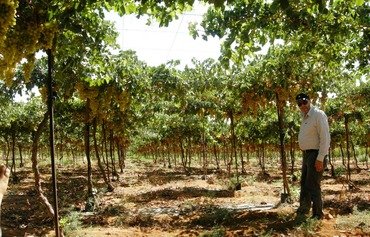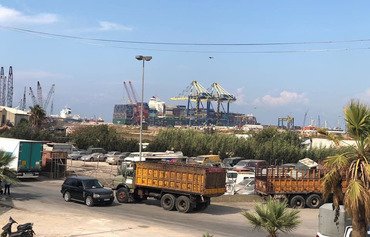The recent reopening of the Nassib-Jaber border crossing with Syria has spurred calls for regulating the entry of agricultural products into Jordan.
Syrian agricultural products, especially fruits and citrus products, have been pouring into the Jordanian market since the crossing was reopened on October 15th after a three-year hiatus.
But Jordanian farmers fear the unregulated entry of these products will negatively impact the competitiveness of domestic crops.
The crossing reopens a direct land route between Syria and Jordan, but also a passage via Jordan to Iraq to the east, and the Gulf to the south.
![Jordanian farmers throw their citrus crops in the streets in protest of Syrian crops being allowed to enter the kingdom without any regulations. [A screenshot from an online video of the protest]](/cnmi_am/images/2018/12/13/15736-jordan-farmers-citrus-600_384.jpg)
Jordanian farmers throw their citrus crops in the streets in protest of Syrian crops being allowed to enter the kingdom without any regulations. [A screenshot from an online video of the protest]
"Farmers in the Jordan Valley recently protested the entry of fruit into the country from Syria, especially citrus products," said Jordan Valley Farmers Union president Adnan Khaddam.
Many of them "dumped and destroyed their crops in protest of the lack of regulation of the entry of agricultural products from Syria", he told Al-Mashareq.
Protecting interests of both sides
The Syrian market is a key strategic market for the Jordanian agricultural sector as Syria is a transit route to Lebanon, Turkey and many European markets, he said.
"The opening of markets between Jordan and Syria is very important in order to recoup the losses suffered by the sector as a result of the closure of the border with Syria and Iraq during the past years," he said.
The agricultural sector in Jordan suffered losses of up to 6 billion Jordanian dinars ($8 billion) from 2012 to 2017, he said, "which was ruinous to many farmers, some of whom were forced to shut down their operations and quit farming".
"Domestic markets were recently saturated with Syrian agricultural products, and with fruits in particular," he said.
"This calls for more co-operation between the two countries to better regulate the flow of products and protect the interests of both sides," he added.
Jordan, for example, produces vegetables in large quantities in the Jordan Valley, which enjoys a warm climate, he said, and it is thus possible to produce certain crops and export them to Syria in the winter.
Before the closure of the border in 2015, Jordan's vegetable and fruit exports to Syria amounted to 200,000 tonnes per year, with exports through Syria to Europe, Turkey and Russia exceeding 60,000 tonnes per year.
Regulating competition
The reopening of the border has still not yielded positive results on the farming sector, said Ayman Sweilem, who owns a farm in the north of the Jordan Valley.
"Before the border’s closure, the situation was excellent and we used to export large quantities [of our crops]," he told Al-Mashareq.
"We thought that the reopening of the border would have a positive impact on us, but over the past two weeks many farmers dumped their citrus products in the streets after massive quantities entered [the country] from Syria," he said.
Competition is healthy and beneficial to consumers because it results in lower prices, Sweilem said, but it must be regulated because chaos "increases our losses and we have already suffered much over the past years".
Jordan and Syria must strengthen their co-operation to protect farmers in both countries, as the agricultural sector is a "pillar of the Jordanian economy", said economist Hossam Ayesh.
The agricultural sector contributes about 6% of Jordan's GDP and creates tens of thousands of jobs, he told Al-Mashareq.
Farmers in Jordan were counting on the reopening of the border with Syria to recoup their losses, he said, therefore, enhanced co-ordination and regulations between the two countries is necessary to maximize the benefit for all.

![Farmers from the Jordan Valley recently protested the entry of Syrian fruits into Jordan, which they said is negatively impacting the sale of their crops. [Photo from the Jordan Valley Farmers Union Facebook page]](/cnmi_am/images/2018/12/13/15714-Jordan-Valley-farms-600_384.jpg)





